I have a sample data frame like this  I am trying to find the intersection between the 2 columns
I am trying to find the intersection between the 2 columns coauthors and nacoauthors using the following code
interscout =
sample_test %>%
mutate( commonauth = intersect( coauthors, nacoauthors) )
and I get this output  I am not sure why I am not able to get the common intersection set using
I am not sure why I am not able to get the common intersection set using intersect in mutate.
Ideally, the last row should be empty and the second row should have only JAMES M ANDERSON on intersection.
Here is the code for the structure.
> dput(sample_test)
structure(list(fname = c("JACK", "JACK", "JACK"), lname = c("SMITH",
"SMITH", "SMITH"), cname = c("JACK SMITH", "JACK A SMITH", "JACK B SMITH"
), coauthors = list(c("AMEY S BAILEY", "JAMES M ANDERSON"), "JAMES M ANDERSON",
"JOHN MURRAY"), nacoauthors = list(c("AMEY S BAILEY", "JAMES M ANDERSON"
), c("AMEY S BAILEY", "JAMES M ANDERSON"), c("AMEY S BAILEY",
"JAMES M ANDERSON"))), row.names = c(NA, -3L), vars = list(fname,
lname), drop = TRUE, indices = list(0:2), group_sizes = 3L, biggest_group_size = 3L, labels = structure(list(
fname = "JACK", lname = "SMITH"), class = "data.frame", row.names = c(NA,
-1L), vars = list(fname, lname), drop = TRUE, .Names = c("fname",
"lname")), class = c("grouped_df", "tbl_df", "tbl", "data.frame"
), .Names = c("fname", "lname", "cname", "coauthors", "nacoauthors"
))